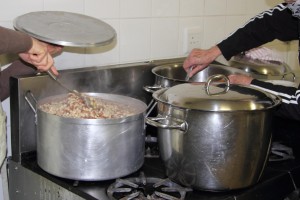Before enlightenment, chop wood, carry water
After enlightenment, chop wood, carry water
Zen Proverb
I often call the daily tasks of life “stirring the oatmeal.” When I hear couples complaining because they can’t get to the gym or take that romantic get-a-way they were hoping for because “Life” gets in the way, I talk with them about being content with “stirring the oatmeal.” You know, making the coffee, folding the laundry, watering the plants, cleaning the bathroom, running the carpool, putting food on the table, putting the baby to bed.
 Those mundane tasks that we see as getting in the way of life are life. They give us the opportunity to slow down and pay close attention. When we do them with attentiveness, they are infused with love and love is always transformative. Folding someone’s laundry with love is very different than folding it angrily. Mowing the grass with deep attention can be a transformative act. Making a meal and breathing love into each vegetable chopped and each spoonful stirred produces a meal of love. Bathing a baby, or a parent, with loving attention is a sacred act.
Those mundane tasks that we see as getting in the way of life are life. They give us the opportunity to slow down and pay close attention. When we do them with attentiveness, they are infused with love and love is always transformative. Folding someone’s laundry with love is very different than folding it angrily. Mowing the grass with deep attention can be a transformative act. Making a meal and breathing love into each vegetable chopped and each spoonful stirred produces a meal of love. Bathing a baby, or a parent, with loving attention is a sacred act.
Those mundane tasks that we see as getting in the way of life are life.
When you are engaged in mundane tasks, when you are just chopping wood or carrying water, invite yourself into a moment of attentiveness. Do you have wood to chop? Lucky you. Do you have the strength to carry it? How precious that is. Is clean water coming out of your faucet? You are one of the fortunate ones. Can you drink that water and feel it running down the back of your parched throat? You are blessed.
Brother Lawrence, a 17th century French Carmelite monk, was made  famous by his way of prayer, now called The Practice of the Presence of God. Brother Lawrence was a lowly monk, not an ordained cleric, and he mostly did the cooking for the more elite monks. In his later years, he repaired sandals which is an ultimate irony since he is also known as The Barefoot Monk. His way of prayer became so renown that many bishops and others higher up than he asked him for counsel about how to pray. After he died, his journals were found and turned into a book. This is one of his journal entries:
famous by his way of prayer, now called The Practice of the Presence of God. Brother Lawrence was a lowly monk, not an ordained cleric, and he mostly did the cooking for the more elite monks. In his later years, he repaired sandals which is an ultimate irony since he is also known as The Barefoot Monk. His way of prayer became so renown that many bishops and others higher up than he asked him for counsel about how to pray. After he died, his journals were found and turned into a book. This is one of his journal entries:
“We ought not to be weary of doing little things for the love of God, who regards not the greatness of the work, but the love with which it is performed.”
The love with which it is performed. I am struck by these words. To perform a mundane task with love is a holy endeavor. To chop wood and carry water, with love, is the path.
Let me repeat that. To chop wood and carry water with love is the path.
To chop wood and carry water with love is the path. Click To TweetYour own attention is what makes something holy. Attention to stirring the oatmeal, washing the clothes, studying for the test, running the carpool. Attention is love. And love is transformative.
 There is a catch. Wherever it is you want to go, whatever it is you want to achieve, whether that is enlightenment or running a marathon, you will still have work to do after you get there, at least if you want to keep moving forward. There might be a momentary “Ahhhh…..I have arrived,” after which the work will begin again. The next meditation will arrive, the next workout will happen, the next carpool will be run, the next day of work will be attended. This cycle of life, which is mostly about giving our loving attention to the most mundane tasks, never ends. Thank God, because it is within these tasks that we have the opportunity to become the best humans we can be.
There is a catch. Wherever it is you want to go, whatever it is you want to achieve, whether that is enlightenment or running a marathon, you will still have work to do after you get there, at least if you want to keep moving forward. There might be a momentary “Ahhhh…..I have arrived,” after which the work will begin again. The next meditation will arrive, the next workout will happen, the next carpool will be run, the next day of work will be attended. This cycle of life, which is mostly about giving our loving attention to the most mundane tasks, never ends. Thank God, because it is within these tasks that we have the opportunity to become the best humans we can be.
This cycle of life, which is mostly about giving our loving attention to the most mundane tasks, never ends.
For a while in my life I had this quote by Charles Kingsley on my bedroom mirror.
“Thank God every morning when you get up that you have something to do which must be done, whether you like it or not. Being forced to work, and forced to do your best, will breed in you temperance, self-control, diligence, strength of will, content, and a hundred other virtues which the idle never know.”
This quote reminded me that “stirring the oatmeal” was indeed a path. And while I reminded myself that it would be better if I could “choose” this path rather than be forced upon this path, (I didn’t resonate with the stoic language of the quote) the truth was that maintaining the mundane tasks of life was, in fact, forming virtues in me that needed to be formed. As I chopped wood and carried water, I saw how very holy these mundane tasks were.
Life is messy. Don’t miss the marvelous in the routine, mundane moments, my Friends.


Amy, Facebook wouldn’t let me post this. Any idea why?
I’m not sure and neither one of us are too tech-savvy. You can always copy/paste the link. That said, both sites can be quirky at times! Thanks for your intent to share at least!